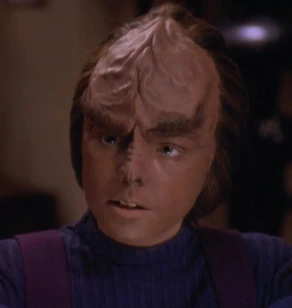If you guys remember, Alexander Rozhenko was Worf's son from his "holodeck encounter" with K'Ehleyr in Season 2 of TNG. I am not sure how long the gestation period is for someone that is 1/4 human and 3/4 klingon so we don't know how old he technically is. However, developmentally he always appears to be an elementary school age boy in the latter seasons of TNG. For example, in his last episode Firstborn he is on a planet playing with a lot of other young boys.
Here is a pic of him in Season 7 of TNG:

Worf arrives at DS9 during Season 4, which would correspond to Season 9 of TNG (if such a season had existed). We first see Alexander again in Season 6 of DS9 and he has joined the Klingon military. Alexander is assigned to join the crew on a Klingon ship commanded by General Martok, the IKS Rotarran. He appears to be a young adult in this episode. However, this episode corresponds to Season 11 of TNG (again if such a season had existed). If each season corresponds to a year that means 9 years after Alexander was conceived he was serving aboard a Klingon ship in the middle of a deadly war.
Here is a pic of Alexander serving aboard the Klingon ship:

So, assuming you consider these events to be canon, what is your best theory? How does Alexander seem to grow up overnight? Was Alexander an oddity who literally shot up mentally and physically during puberty? Do Klingons age quicker than humans? Has Worf’s memory been altered making it so that he doesn’t know what his son looks like or when he was born so that he does not realize that his son was replaced by a Changeling duplicate that wanted to infiltrate General Martok’s ship?
Post your best theory!
Here is a pic of him in Season 7 of TNG:

Worf arrives at DS9 during Season 4, which would correspond to Season 9 of TNG (if such a season had existed). We first see Alexander again in Season 6 of DS9 and he has joined the Klingon military. Alexander is assigned to join the crew on a Klingon ship commanded by General Martok, the IKS Rotarran. He appears to be a young adult in this episode. However, this episode corresponds to Season 11 of TNG (again if such a season had existed). If each season corresponds to a year that means 9 years after Alexander was conceived he was serving aboard a Klingon ship in the middle of a deadly war.
Here is a pic of Alexander serving aboard the Klingon ship:

So, assuming you consider these events to be canon, what is your best theory? How does Alexander seem to grow up overnight? Was Alexander an oddity who literally shot up mentally and physically during puberty? Do Klingons age quicker than humans? Has Worf’s memory been altered making it so that he doesn’t know what his son looks like or when he was born so that he does not realize that his son was replaced by a Changeling duplicate that wanted to infiltrate General Martok’s ship?
Post your best theory!



